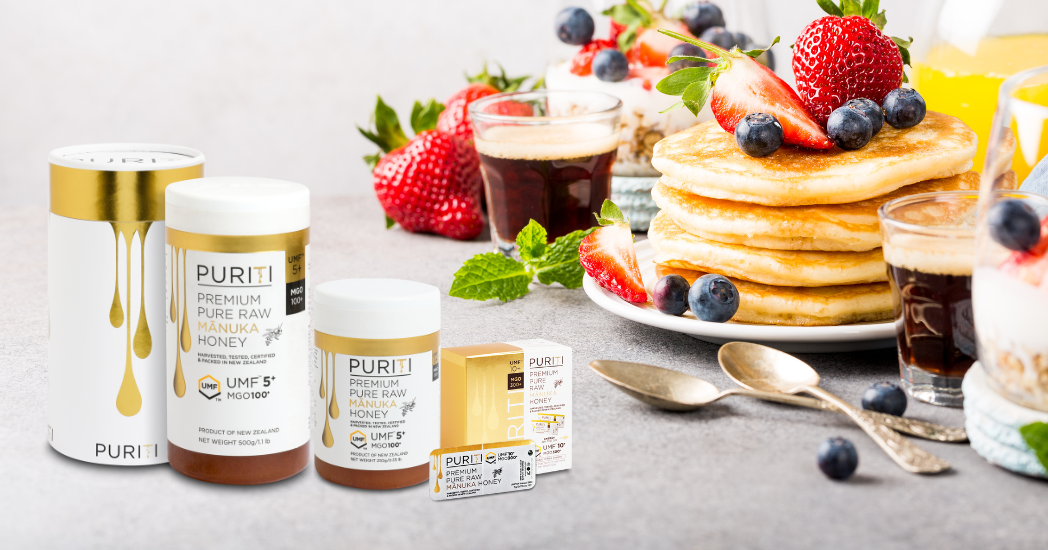6 Surprising Health Benefits of Manuka Honey (That Are Backed by Science)
There’s honey… and then there’s Manuka honey — a golden powerhouse from New Zealand that’s been used for centuries and is now being backed by modern science.
Unlike regular honey, Manuka is made by bees that pollinate the Manuka bush (Leptospermum scoparium). It’s naturally rich in methylglyoxal (MGO), the compound that gives Manuka its antibacterial and healing superpowers.
From supporting digestion to soothing sore throats, here’s a closer look at six science-supported ways Manuka honey may benefit your health — and why it deserves a permanent place in your wellness toolkit.
1. It Supports Wound Healing (Even the Stubborn Ones)
Long before labs confirmed it, ancient cultures were already using honey to treat burns, wounds, and skin infections. Science now supports this: Manuka honey can speed up wound healing, reduce inflammation, and help regenerate tissue.
What’s more, it’s been found effective even against tough, antibiotic-resistant infections like MRSA — a strain that doesn’t respond well to standard treatments.
Manuka helps by keeping the wound moist, forming a protective barrier, and fighting off harmful microbes. While it’s not a replacement for antibiotics in serious cases, it’s gaining interest as a trusted complementary remedy — especially for skin health and recovery.
2. It May Improve Oral Health Naturally
Forget mouthwashes packed with harsh chemicals. Research shows that Manuka honey may combat the bacteria responsible for plaque buildup, gum disease, and tooth decay.
In particular, it’s been shown to inhibit the growth of harmful oral bacteria like P. gingivalis and A. actinomycetemcomitans — two major culprits behind gum inflammation.
So yes, something sweet can actually help protect your teeth — just as long as it’s the right kind of sweet.
3. It Helps Calm Coughs and Soothe Sore Throats
That tickle in your throat might need more than just warm water. Studies suggest Manuka honey may ease coughing better than some common over-the-counter medications, particularly in upper respiratory tract infections (URIs).
Its thick, soothing texture coats the throat, while its antibacterial properties may help address the root cause of irritation — especially in viral infections where antibiotics don’t help.
For seasonal support, high UMF™-rated Manuka honey or lozenges made with pure Manuka honey can be a natural go-to remedy to keep on hand.
4. It May Help Prevent Stomach Ulcers
Stomach ulcers are painful, often caused by H. pylori, a common gut bacteria. Interesting findings suggest that people who regularly consume honey have a lower risk of H. pylori infection — and Manuka’s antimicrobial strength may help explain why.
In one study, individuals who ate honey five or more times per week had a significantly reduced risk of infection.
While more human trials are needed, these early insights are promising—especially if you struggle with frequent stomach discomfort or digestive imbalances.
5. It May Ease Digestive Issues (Like IBD and Bloating)
Gut inflammation can be disruptive and exhausting. Early studies, including animal research, show that Manuka honey may help reduce inflammation in the gut, support healthy bacteria, and even suppress strains like C. diff — known for causing severe diarrhea and inflammation.
Whether you’re dealing with chronic digestive issues or just want to support overall gut balance, adding a spoonful of Manuka honey to your daily routine may be a gentle and tasty way to help your gut feel better.
6. It May Support Respiratory Health in Cystic Fibrosis
Cystic fibrosis makes the lungs vulnerable to persistent, serious infections. Test-tube research has shown that Manuka honey, when combined with antibiotics, may help inhibit the bacteria linked to these lung infections, like P. aeruginosa and B. cepacia.
While more research is needed, especially in human trials, this could open up new possibilities for natural adjunct therapies — especially for vulnerable populations.
Is Manuka Honey Safe for Everyone?
For most people, yes — especially when taken in moderation.
But keep in mind:
-
Infants under 12 months should not consume any kind of honey (due to botulism risk).
-
People with diabetes should be mindful of natural sugar content and consult their doctor.
-
Allergies to bees or honey? Always check with a healthcare provider before trying.
FAQs About Manuka Honey
🟡 What makes Manuka honey so special?
Its high MGO content gives it powerful antibacterial, anti-inflammatory, and antioxidant properties that go far beyond regular honey.
🟡 How is it different from other types of honey?
Manuka honey comes only from bees that pollinate the New Zealand Manuka bush and is one of the few honeys scientifically tested and rated for its bioactive strength.
🟡 Can I take it every day?
Absolutely — most people can enjoy a teaspoon a day as part of a balanced routine. As with anything sweet, moderation matters.
The Bottom Line
From soothing sore throats to supporting gut health and promoting faster wound healing, Manuka honey is more than a sweet treat — it’s a natural multitasker backed by both tradition and science.
If you’re looking to add a small daily ritual with big wellness benefits, Manuka honey is a great place to start. Just make sure you’re choosing the real deal — UMF™ certified and sourced from trusted producers in New Zealand, like PURITI.
Your wellness routine doesn’t need more complexity. Just a spoonful of the right kind of honey.

